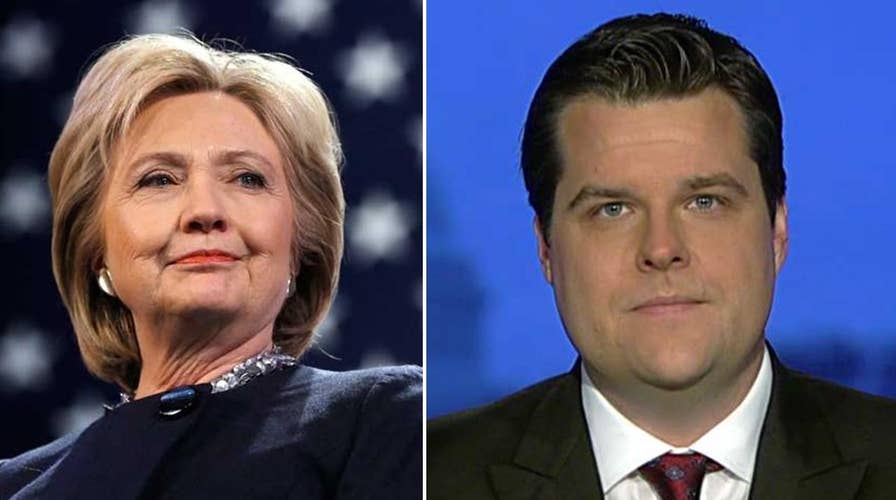Lawmakers demand probe into 'special' treatment of Clinton
Rep. Matt Gaetz sounds off on the 'double standard' in the FBI investigation.
Hillary Clinton called Monica Lewinsky a “narcissistic loony tune.” She called Gennifer Flowers “some failed cabaret singer.” She said Republicans in Congress had organized “a vast right-wing conspiracy” against her husband, President Bill Clinton.
And now the former secretary of state and defeated Democratic presidential candidate says those of us still interested in the investigating of her conduct are engaging in an “abuse of power.”
Hillary Clinton expects special treatment. She always has. The real question is: why did the FBI give it to her?
The FBI’s investigation of Hillary Clinton was referred to as “special” in an email sent by current FBI Deputy Director Andrew McCabe. He was the assistant director in charge of the FBI’s Washington Field Office before his promotion to the second-ranking spot in the bureau.
Despite a deep web of connections to Clinton, McCabe formally recused himself from the email investigation only a week before the 2016 election. McCabe’s admissions are telling, but not inaccurate.
Four months have passed since 20 members of the House Judiciary Committee demanded a special counsel to investigate Hillary Clinton. No action from the Department of Justice has been taken.
Only a special person could have her spouse meet with Attorney General Loretta Lynch on a tarmac in Phoenix during an ongoing criminal investigation. Recently released emails show that Bill Clinton purposely altered his departure to get time alone with Lynch.
While the FBI was very concerned with punishing the agent who disclosed the Lynch-Bill Clinton meeting, the impropriety of the gathering garnered far less attention.
When Lynch told then-FBI Director James Comey to refer to the Hillary Clinton investigation as a “matter” rather than an “investigation,” language had a special meaning.
According to McCabe, “the decision was made to investigate (Hillary Clinton) at HQ with a small team.” The double standard is glaring. More prosecutors are currently investigating President Trump than were assigned to the Oklahoma City bombing, but Hillary Clinton got the small team at HQ.
And how did the “small team at HQ” handle the investigation? In a word – special. Somewhere between the first and the final draft, Comey’s statement changed. He first wrote that Hillary Clinton’s use of a private email server was “grossly negligent.” The final draft said she was “extremely careless.”
Comey’s exoneration was drafted before the FBI interviewed key witnesses – including Clinton herself.
When Intelligence Community Inspector General Charles McCullough confronted officials about the depth of Clinton’s crimes, he faced threats and “personal blowback” against him and his family.
McCullough’s reports were delivered to then-Director of National Intelligence James Clapper. Clapper spoke of the “heartburn” that exposure would create for Hillary Clinton’s campaign.
In every instance, being special has redounded to Hillary Clinton’s political and legal benefit. Not so for President Trump. Some at the Department of Justice and the FBI seem to have a special bias against the president.
FBI Agent Peter Strzok sent biased anti-Trump text messages. He worked on both the Clinton email scandal and the Mueller probe. It remains unclear what evidence he reviewed, generated or damaged in either investigation.
Four months have passed since 20 members of the House Judiciary Committee demanded a special counsel to investigate Hillary Clinton. No action from the Department of Justice has been taken.
As members of the Judiciary Committee, we have demanded an investigation into the FBI’s procedures, practices, oversight and reporting. If biased agents have tainted evidence, we need to see it. If politically-interested prosecutors have an agenda, we need to know it. If our government institutions are being undermined by the deep state, we must expose it.
After all, equal treatment under the law is just one thing that makes America so special.

